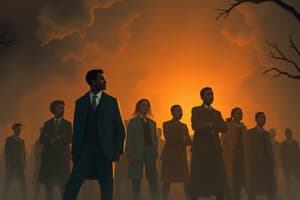Podcast
Questions and Answers
What was the outcome of Plessy v. Ferguson?
What was the outcome of Plessy v. Ferguson?
- Plessy was awarded damages
- Civil Rights Act was passed
- Allowed 'separate but equal' to become law (correct)
- Segregation was deemed unconstitutional
What system dominated agriculture across the Southern United States by the early 1870s?
What system dominated agriculture across the Southern United States by the early 1870s?
Sharecropping
What did Jim Crow laws mandate?
What did Jim Crow laws mandate?
- Voting rights for all citizens
- Equal rights for African Americans
- Integration of public facilities
- Segregation of public schools and places (correct)
What was the purpose of the Chinese Exclusion Act of 1882?
What was the purpose of the Chinese Exclusion Act of 1882?
Who used vertical integration to dominate the steel industry?
Who used vertical integration to dominate the steel industry?
What is the Gospel of Wealth?
What is the Gospel of Wealth?
How did the government support the expansion of railroads?
How did the government support the expansion of railroads?
Flashcards are hidden until you start studying
Study Notes
Plessy v. Ferguson
- Homer Plessy arrested for sitting in 'whites only' section of a train on June 7, 1892.
- Supreme Court ruling established the doctrine of 'separate but equal.'
- The case upheld segregation laws, leading to the proliferation of Jim Crow laws against African Americans.
- Plessy's arguments centered on the 13th and 14th Amendments, which were disregarded by the Court.
Sharecropping
- Emerged in the South by the 1870s as a dominant agriculture system.
- African American families rented small plots of land and paid landowners a portion of their crop.
- Offered autonomy but often resulted in debt due to high costs of tools and supplies.
- Many sharecroppers faced exploitative contracts, limiting their ability to improve their economic status.
Jim Crow Laws
- Enacted post-Reconstruction to enforce racial segregation in Southern states.
- Segregated public schools, transportation, and facilities like restrooms and restaurants.
- The U.S. military and federal workplaces also imposed segregation under President Woodrow Wilson.
- Jim Crow laws were largely overruled by the Civil Rights Act of 1964 and the Voting Rights Act of 1965.
Chinese Exclusion Act
- Formal name: Immigration Act of 1882; the first federal law to suspend immigration based on nationality.
- Prohibited Chinese laborers from entering the U.S., affecting both skilled and unskilled workers.
- Subsequent amendments prevented re-entry of Chinese laborers who left the country.
- Marked a shift towards restrictive immigration policies motivated by racial hostility.
Carnegie
- Utilized vertical integration to dominate the steel industry.
- Controlled all facets of production, from resource acquisition to distribution, establishing a monopoly.
Gospel of Wealth
- The rich justified their wealth as divinely sanctioned or a result of natural selection.
- Contributed to a plutocratic government where the wealthy held significant influence.
- Corporations leveraged the 14th Amendment, arguing they had legal personhood to protect their interests.
Government Support for Railroad Expansion
- Supreme Court ruling in the Wabash case limited states' power to regulate interstate commerce, benefiting railroad monopolies.
- Congress passed the Interstate Commerce Act to regulate railroads by prohibiting unfair practices and requiring transparent pricing.
- The Act aimed to promote fair competition and protect shippers from railroad exploitation.
Studying That Suits You
Use AI to generate personalized quizzes and flashcards to suit your learning preferences.




